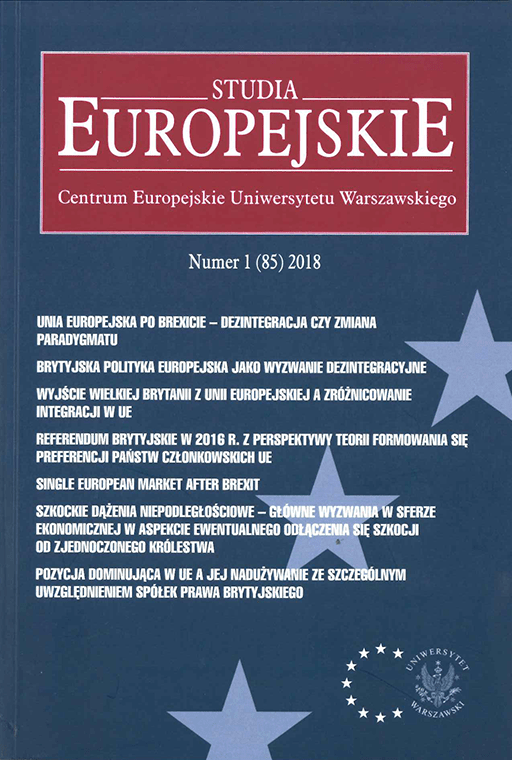
ISSUE: 1/2018
- Volume 85
- Number 1
- 2018
Subscribe NEWSLETTER
Studia Europejskie –
Studies in European Affairs
ISSN: 1428-149X
e-ISSN: 2719-3780
License
Articles published in the journal are under a Creative Commons Attribution – Non Commercial – No Derivatives 4.0 International License
Unia Europejska po brexicie – dezintegracja czy zmiana paradygmatu
The European Union after Brexit – Disintegration or Paradigm Change
Abstract
The referendum on leaving the European Union held in the United Kingdom in June 2016 undoubtedly opened a new chapter in the history of the European integration. The general theory of international organizations tells us that countries normally leave international institutions as an act of last resort, when they are sidelined or feeling unable to shape their future. Was the UK in such a position in the EU? Or was the result of the British referendum rather a side effect of a small adaptability of the European institutions to global challenges, which in turn sparked a democratic revolt, erupted in an eurosceptic country? It is argued here that, regardless of the causes, the British issue influenced further polarization between federal and anti-federal forces in the European Union, and because the former are still in minority, the European Union will most likely pass over the Brexit to proceed according to the old agenda, maybe with some minor institutional changes, like readjustment of the seats in the European Parliament, but significantly weakened on the global scene.
References
Andersson J.J., Fiott D., Missiroli A., After the EU global strategy – consulting the experts: security and defence, European Union Institute for Security Studies, 2016.
Black J., Hall A., Cox K. et al., Defense and security after Brexit. Understanding the possible implications of the UK’s decision to leave the EU, Overview report, RAND Corporation, RR-1786/1-RC, 2017.
Bond I., Besch S., Gostyńska-Jakubowska A. et al., Europe after Brexit, Unleashed or undone?, Centre for European Reform, April 2016.
Fabulas F., Brexit isn’t all that special. Here’s why nations leave international organizations, “Washington Post”, 1.07.2016.
Faleg G., The Implications of Brexit for the EU’s Common Security and Defence Policy, “CEPS Commentary”, 26.07.2016.
Grant Ch., The Impact of Brexit on the EU, “Insights”, Centre for European Reform, 24.06.2016.
Grauwe P. De, What Future for the EU After Brexit? “Intereconomics”, vol.51, no. 5/ September/October 2016.
Juncker J.-C., State of the Union Address 2016: Towards a better Europe – a Europe that protects, empowers and defends, Strasbourg, 14.09.2016.
Kelemen R.D., London Falling: Life After Brexit, “Foreign Affairs”, 27.06.2016.
Krastev I., A Fraying Union?, “Journal of Democracy”, vol. 23, no. 4/October 2012.
Macron E., Initiative pour l’Europe. Une Europe souveraine, unie, démocratique, La Sorbonne, Paris, 26.09.2017.
Moravcsik A., Brexit: Welcome, Britain, to the Hotel California, “Princeton Alumni Weekly”, 14.09.2016.
Olivier T., The EU Falling Apart? Theoretical Discussions of Brexit, Grexit and Other Exit Scenarios, w: Solidarity in the European Union, A Fundamental Value in Crisis, red. Grimmel A., My Giang S., Springer 2017.
Organski A.F.K., World Politics, New York 1958.
Ponzano P., European Parliament’s Reports Concerning the Application of the Lisbon Treaty and the European Treaties’ Review, “The Federalist Debate”, year XXX, no. 2/July 2017.
Vollaard H., Explaining European Disintegration, “Journal of Common Market Studies”, vol. 52, issue 5/2014.
Webber D., How likely is it that the European Union will disintegrate? A critical analysis of competing theoretical perspectives, “European Journal of International Relations”, vol. 20, issue 2/2014.
Language: Polish
Pages: 9-22
How to Cite:
Harvard
Kobza, P. (2018) "Unia Europejska po brexicie – dezintegracja czy zmiana paradygmatu". Studia Europejskie – Studies in European Affairs, 1/2018, pp. 9-22.